Impact of Culture, Politics, and Power on Organisational Behaviour
VerifiedAdded on 2021/02/21
|15
|5120
|471
Report
AI Summary
This report provides a comprehensive analysis of organisational behaviour within an organisation, focusing on the impact of culture, politics, and power on individual and team dynamics. Using Sainsbury as a case study, the report explores various aspects of organisational culture, including Handy’s model and Hofstede’s cultural dimensions, to understand how these factors influence behaviour. It examines the different types of power – legitimate, expert, coercive, and reward – and their effects on employees. The report also evaluates content and process theories of motivation, such as Maslow's hierarchy of needs and Vroom's expectancy theory, to determine how organisations can effectively motivate their workforce. Furthermore, it demonstrates effective cooperation strategies and applies organisational behaviour philosophies to enhance individual behaviour, concluding with a critical analysis of team development theories. Desklib offers a wealth of similar solved assignments and past papers for students.
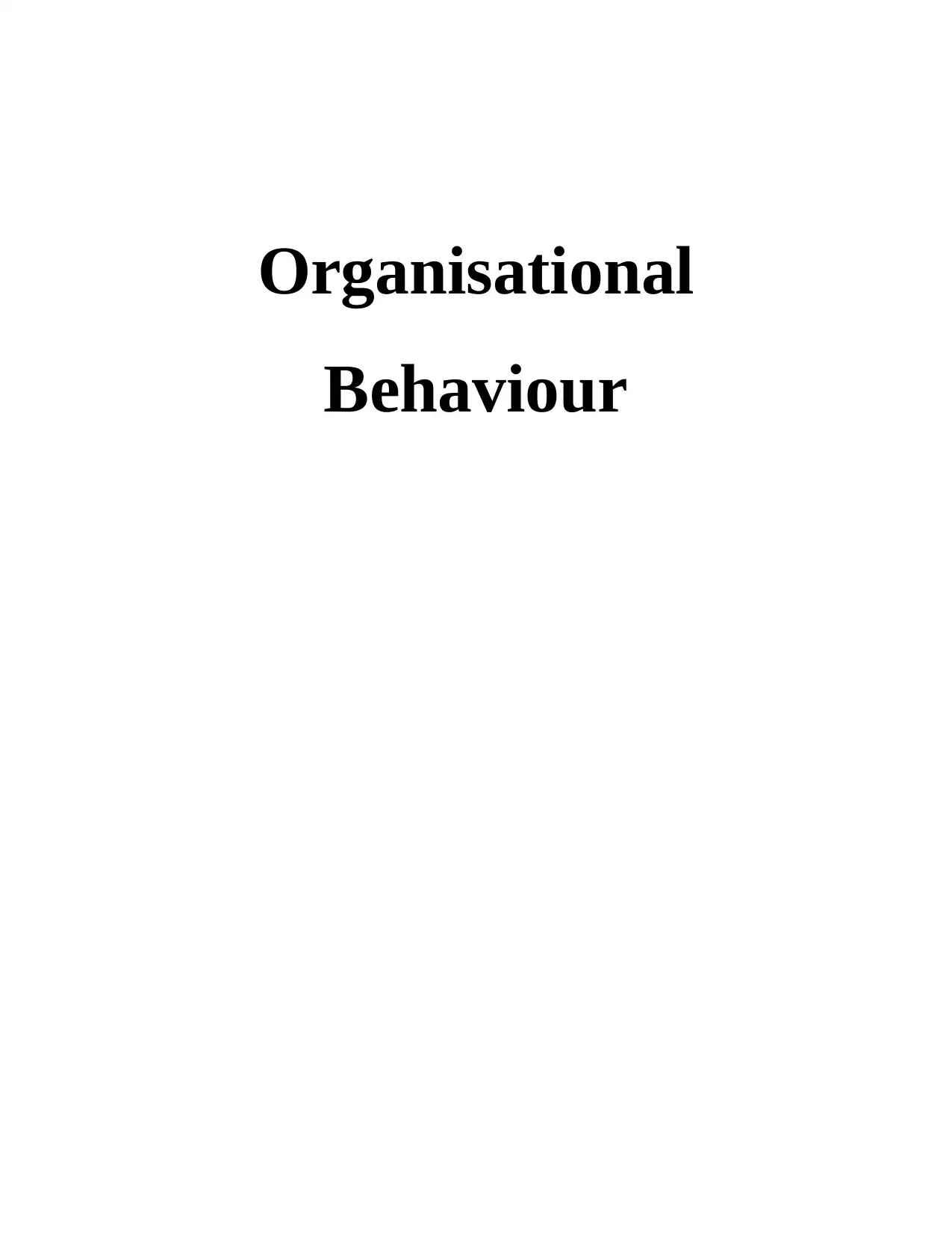
Organisational
Behaviour
Behaviour
Paraphrase This Document
Need a fresh take? Get an instant paraphrase of this document with our AI Paraphraser
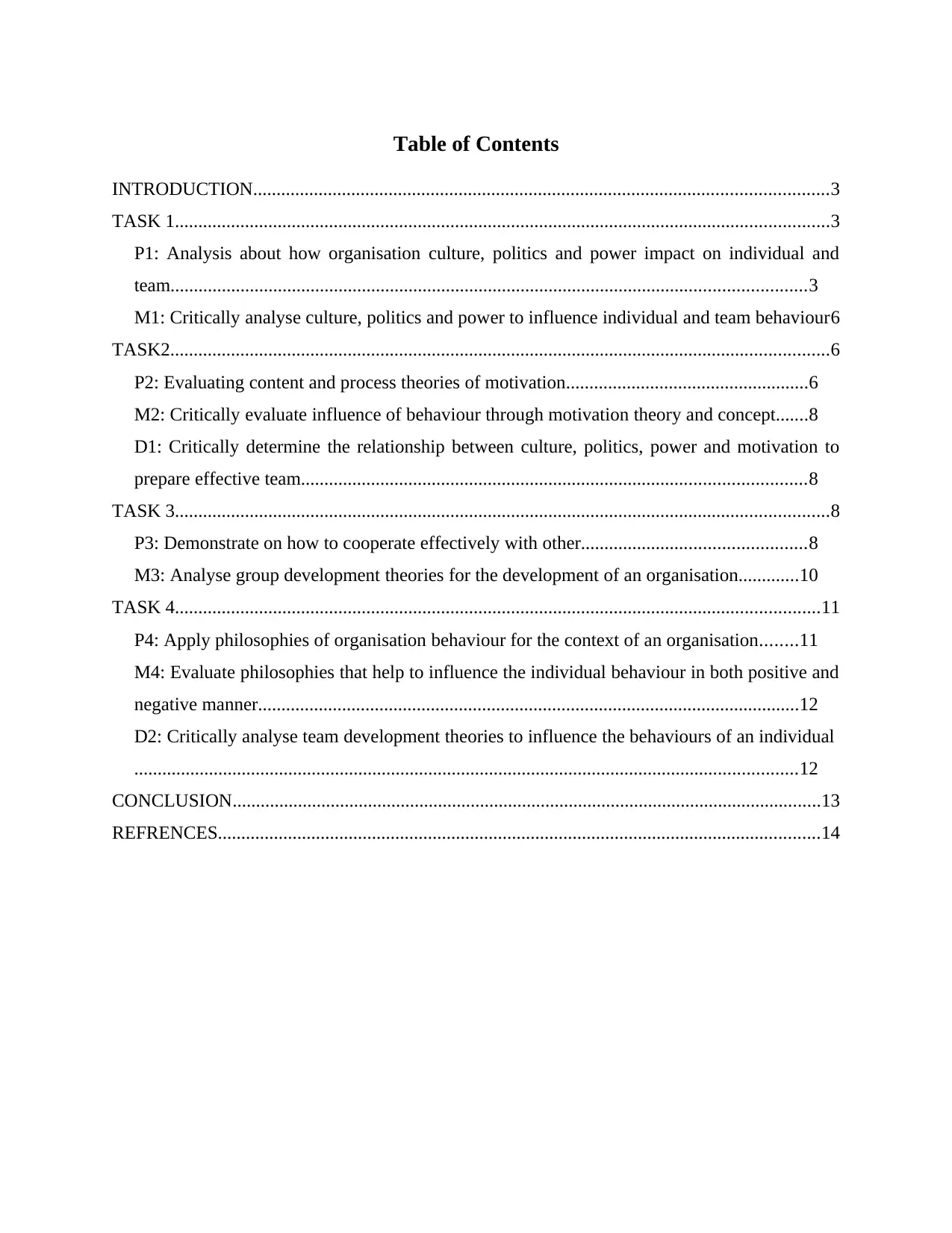
Table of Contents
INTRODUCTION...........................................................................................................................3
TASK 1............................................................................................................................................3
P1: Analysis about how organisation culture, politics and power impact on individual and
team........................................................................................................................................3
M1: Critically analyse culture, politics and power to influence individual and team behaviour6
TASK2.............................................................................................................................................6
P2: Evaluating content and process theories of motivation....................................................6
M2: Critically evaluate influence of behaviour through motivation theory and concept.......8
D1: Critically determine the relationship between culture, politics, power and motivation to
prepare effective team............................................................................................................8
TASK 3............................................................................................................................................8
P3: Demonstrate on how to cooperate effectively with other................................................8
M3: Analyse group development theories for the development of an organisation.............10
TASK 4..........................................................................................................................................11
P4: Apply philosophies of organisation behaviour for the context of an organisation........11
M4: Evaluate philosophies that help to influence the individual behaviour in both positive and
negative manner....................................................................................................................12
D2: Critically analyse team development theories to influence the behaviours of an individual
..............................................................................................................................................12
CONCLUSION..............................................................................................................................13
REFRENCES.................................................................................................................................14
INTRODUCTION...........................................................................................................................3
TASK 1............................................................................................................................................3
P1: Analysis about how organisation culture, politics and power impact on individual and
team........................................................................................................................................3
M1: Critically analyse culture, politics and power to influence individual and team behaviour6
TASK2.............................................................................................................................................6
P2: Evaluating content and process theories of motivation....................................................6
M2: Critically evaluate influence of behaviour through motivation theory and concept.......8
D1: Critically determine the relationship between culture, politics, power and motivation to
prepare effective team............................................................................................................8
TASK 3............................................................................................................................................8
P3: Demonstrate on how to cooperate effectively with other................................................8
M3: Analyse group development theories for the development of an organisation.............10
TASK 4..........................................................................................................................................11
P4: Apply philosophies of organisation behaviour for the context of an organisation........11
M4: Evaluate philosophies that help to influence the individual behaviour in both positive and
negative manner....................................................................................................................12
D2: Critically analyse team development theories to influence the behaviours of an individual
..............................................................................................................................................12
CONCLUSION..............................................................................................................................13
REFRENCES.................................................................................................................................14
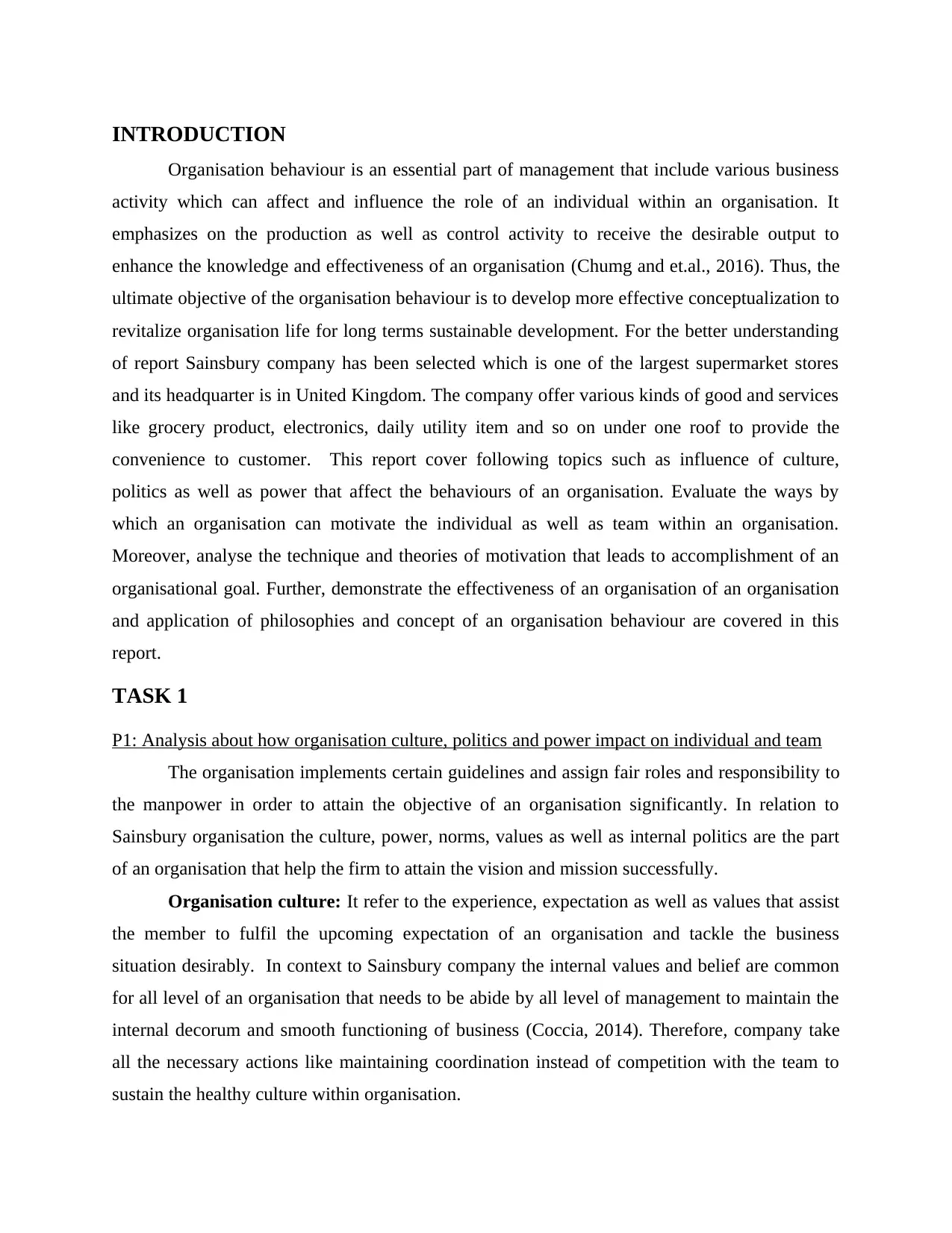
INTRODUCTION
Organisation behaviour is an essential part of management that include various business
activity which can affect and influence the role of an individual within an organisation. It
emphasizes on the production as well as control activity to receive the desirable output to
enhance the knowledge and effectiveness of an organisation (Chumg and et.al., 2016). Thus, the
ultimate objective of the organisation behaviour is to develop more effective conceptualization to
revitalize organisation life for long terms sustainable development. For the better understanding
of report Sainsbury company has been selected which is one of the largest supermarket stores
and its headquarter is in United Kingdom. The company offer various kinds of good and services
like grocery product, electronics, daily utility item and so on under one roof to provide the
convenience to customer. This report cover following topics such as influence of culture,
politics as well as power that affect the behaviours of an organisation. Evaluate the ways by
which an organisation can motivate the individual as well as team within an organisation.
Moreover, analyse the technique and theories of motivation that leads to accomplishment of an
organisational goal. Further, demonstrate the effectiveness of an organisation of an organisation
and application of philosophies and concept of an organisation behaviour are covered in this
report.
TASK 1
P1: Analysis about how organisation culture, politics and power impact on individual and team
The organisation implements certain guidelines and assign fair roles and responsibility to
the manpower in order to attain the objective of an organisation significantly. In relation to
Sainsbury organisation the culture, power, norms, values as well as internal politics are the part
of an organisation that help the firm to attain the vision and mission successfully.
Organisation culture: It refer to the experience, expectation as well as values that assist
the member to fulfil the upcoming expectation of an organisation and tackle the business
situation desirably. In context to Sainsbury company the internal values and belief are common
for all level of an organisation that needs to be abide by all level of management to maintain the
internal decorum and smooth functioning of business (Coccia, 2014). Therefore, company take
all the necessary actions like maintaining coordination instead of competition with the team to
sustain the healthy culture within organisation.
Organisation behaviour is an essential part of management that include various business
activity which can affect and influence the role of an individual within an organisation. It
emphasizes on the production as well as control activity to receive the desirable output to
enhance the knowledge and effectiveness of an organisation (Chumg and et.al., 2016). Thus, the
ultimate objective of the organisation behaviour is to develop more effective conceptualization to
revitalize organisation life for long terms sustainable development. For the better understanding
of report Sainsbury company has been selected which is one of the largest supermarket stores
and its headquarter is in United Kingdom. The company offer various kinds of good and services
like grocery product, electronics, daily utility item and so on under one roof to provide the
convenience to customer. This report cover following topics such as influence of culture,
politics as well as power that affect the behaviours of an organisation. Evaluate the ways by
which an organisation can motivate the individual as well as team within an organisation.
Moreover, analyse the technique and theories of motivation that leads to accomplishment of an
organisational goal. Further, demonstrate the effectiveness of an organisation of an organisation
and application of philosophies and concept of an organisation behaviour are covered in this
report.
TASK 1
P1: Analysis about how organisation culture, politics and power impact on individual and team
The organisation implements certain guidelines and assign fair roles and responsibility to
the manpower in order to attain the objective of an organisation significantly. In relation to
Sainsbury organisation the culture, power, norms, values as well as internal politics are the part
of an organisation that help the firm to attain the vision and mission successfully.
Organisation culture: It refer to the experience, expectation as well as values that assist
the member to fulfil the upcoming expectation of an organisation and tackle the business
situation desirably. In context to Sainsbury company the internal values and belief are common
for all level of an organisation that needs to be abide by all level of management to maintain the
internal decorum and smooth functioning of business (Coccia, 2014). Therefore, company take
all the necessary actions like maintaining coordination instead of competition with the team to
sustain the healthy culture within organisation.
⊘ This is a preview!⊘
Do you want full access?
Subscribe today to unlock all pages.

Trusted by 1+ million students worldwide
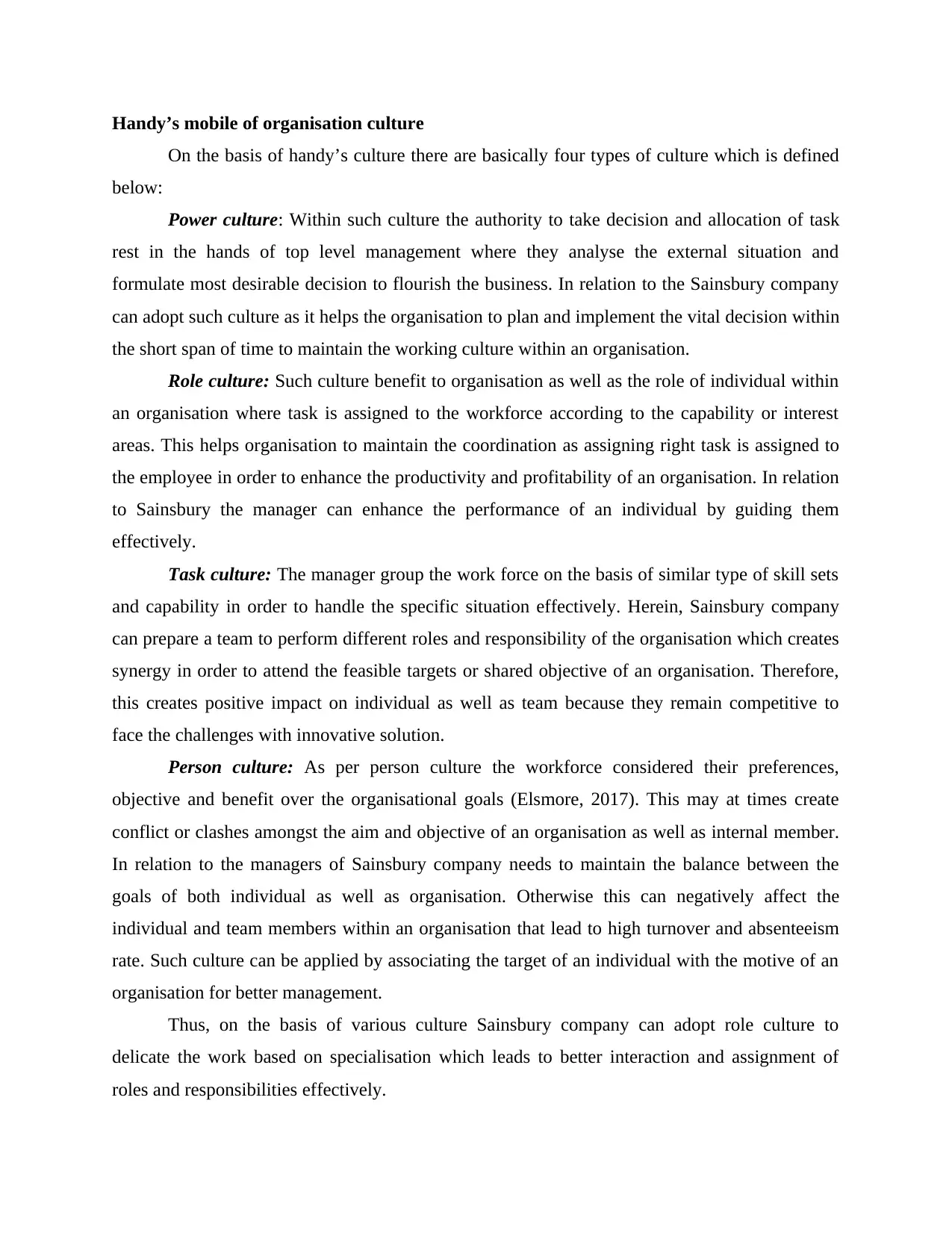
Handy’s mobile of organisation culture
On the basis of handy’s culture there are basically four types of culture which is defined
below:
Power culture: Within such culture the authority to take decision and allocation of task
rest in the hands of top level management where they analyse the external situation and
formulate most desirable decision to flourish the business. In relation to the Sainsbury company
can adopt such culture as it helps the organisation to plan and implement the vital decision within
the short span of time to maintain the working culture within an organisation.
Role culture: Such culture benefit to organisation as well as the role of individual within
an organisation where task is assigned to the workforce according to the capability or interest
areas. This helps organisation to maintain the coordination as assigning right task is assigned to
the employee in order to enhance the productivity and profitability of an organisation. In relation
to Sainsbury the manager can enhance the performance of an individual by guiding them
effectively.
Task culture: The manager group the work force on the basis of similar type of skill sets
and capability in order to handle the specific situation effectively. Herein, Sainsbury company
can prepare a team to perform different roles and responsibility of the organisation which creates
synergy in order to attend the feasible targets or shared objective of an organisation. Therefore,
this creates positive impact on individual as well as team because they remain competitive to
face the challenges with innovative solution.
Person culture: As per person culture the workforce considered their preferences,
objective and benefit over the organisational goals (Elsmore, 2017). This may at times create
conflict or clashes amongst the aim and objective of an organisation as well as internal member.
In relation to the managers of Sainsbury company needs to maintain the balance between the
goals of both individual as well as organisation. Otherwise this can negatively affect the
individual and team members within an organisation that lead to high turnover and absenteeism
rate. Such culture can be applied by associating the target of an individual with the motive of an
organisation for better management.
Thus, on the basis of various culture Sainsbury company can adopt role culture to
delicate the work based on specialisation which leads to better interaction and assignment of
roles and responsibilities effectively.
On the basis of handy’s culture there are basically four types of culture which is defined
below:
Power culture: Within such culture the authority to take decision and allocation of task
rest in the hands of top level management where they analyse the external situation and
formulate most desirable decision to flourish the business. In relation to the Sainsbury company
can adopt such culture as it helps the organisation to plan and implement the vital decision within
the short span of time to maintain the working culture within an organisation.
Role culture: Such culture benefit to organisation as well as the role of individual within
an organisation where task is assigned to the workforce according to the capability or interest
areas. This helps organisation to maintain the coordination as assigning right task is assigned to
the employee in order to enhance the productivity and profitability of an organisation. In relation
to Sainsbury the manager can enhance the performance of an individual by guiding them
effectively.
Task culture: The manager group the work force on the basis of similar type of skill sets
and capability in order to handle the specific situation effectively. Herein, Sainsbury company
can prepare a team to perform different roles and responsibility of the organisation which creates
synergy in order to attend the feasible targets or shared objective of an organisation. Therefore,
this creates positive impact on individual as well as team because they remain competitive to
face the challenges with innovative solution.
Person culture: As per person culture the workforce considered their preferences,
objective and benefit over the organisational goals (Elsmore, 2017). This may at times create
conflict or clashes amongst the aim and objective of an organisation as well as internal member.
In relation to the managers of Sainsbury company needs to maintain the balance between the
goals of both individual as well as organisation. Otherwise this can negatively affect the
individual and team members within an organisation that lead to high turnover and absenteeism
rate. Such culture can be applied by associating the target of an individual with the motive of an
organisation for better management.
Thus, on the basis of various culture Sainsbury company can adopt role culture to
delicate the work based on specialisation which leads to better interaction and assignment of
roles and responsibilities effectively.
Paraphrase This Document
Need a fresh take? Get an instant paraphrase of this document with our AI Paraphraser
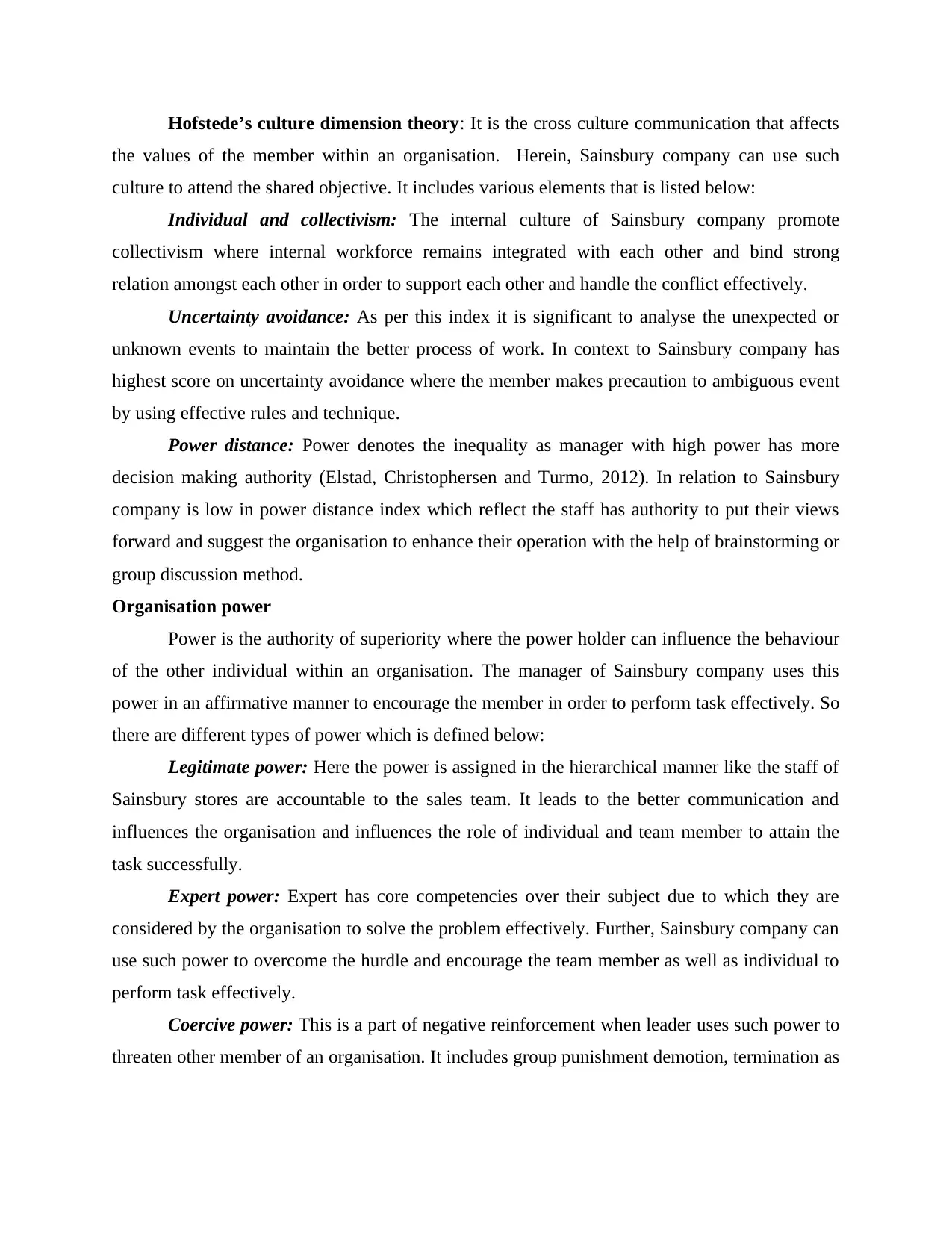
Hofstede’s culture dimension theory: It is the cross culture communication that affects
the values of the member within an organisation. Herein, Sainsbury company can use such
culture to attend the shared objective. It includes various elements that is listed below:
Individual and collectivism: The internal culture of Sainsbury company promote
collectivism where internal workforce remains integrated with each other and bind strong
relation amongst each other in order to support each other and handle the conflict effectively.
Uncertainty avoidance: As per this index it is significant to analyse the unexpected or
unknown events to maintain the better process of work. In context to Sainsbury company has
highest score on uncertainty avoidance where the member makes precaution to ambiguous event
by using effective rules and technique.
Power distance: Power denotes the inequality as manager with high power has more
decision making authority (Elstad, Christophersen and Turmo, 2012). In relation to Sainsbury
company is low in power distance index which reflect the staff has authority to put their views
forward and suggest the organisation to enhance their operation with the help of brainstorming or
group discussion method.
Organisation power
Power is the authority of superiority where the power holder can influence the behaviour
of the other individual within an organisation. The manager of Sainsbury company uses this
power in an affirmative manner to encourage the member in order to perform task effectively. So
there are different types of power which is defined below:
Legitimate power: Here the power is assigned in the hierarchical manner like the staff of
Sainsbury stores are accountable to the sales team. It leads to the better communication and
influences the organisation and influences the role of individual and team member to attain the
task successfully.
Expert power: Expert has core competencies over their subject due to which they are
considered by the organisation to solve the problem effectively. Further, Sainsbury company can
use such power to overcome the hurdle and encourage the team member as well as individual to
perform task effectively.
Coercive power: This is a part of negative reinforcement when leader uses such power to
threaten other member of an organisation. It includes group punishment demotion, termination as
the values of the member within an organisation. Herein, Sainsbury company can use such
culture to attend the shared objective. It includes various elements that is listed below:
Individual and collectivism: The internal culture of Sainsbury company promote
collectivism where internal workforce remains integrated with each other and bind strong
relation amongst each other in order to support each other and handle the conflict effectively.
Uncertainty avoidance: As per this index it is significant to analyse the unexpected or
unknown events to maintain the better process of work. In context to Sainsbury company has
highest score on uncertainty avoidance where the member makes precaution to ambiguous event
by using effective rules and technique.
Power distance: Power denotes the inequality as manager with high power has more
decision making authority (Elstad, Christophersen and Turmo, 2012). In relation to Sainsbury
company is low in power distance index which reflect the staff has authority to put their views
forward and suggest the organisation to enhance their operation with the help of brainstorming or
group discussion method.
Organisation power
Power is the authority of superiority where the power holder can influence the behaviour
of the other individual within an organisation. The manager of Sainsbury company uses this
power in an affirmative manner to encourage the member in order to perform task effectively. So
there are different types of power which is defined below:
Legitimate power: Here the power is assigned in the hierarchical manner like the staff of
Sainsbury stores are accountable to the sales team. It leads to the better communication and
influences the organisation and influences the role of individual and team member to attain the
task successfully.
Expert power: Expert has core competencies over their subject due to which they are
considered by the organisation to solve the problem effectively. Further, Sainsbury company can
use such power to overcome the hurdle and encourage the team member as well as individual to
perform task effectively.
Coercive power: This is a part of negative reinforcement when leader uses such power to
threaten other member of an organisation. It includes group punishment demotion, termination as
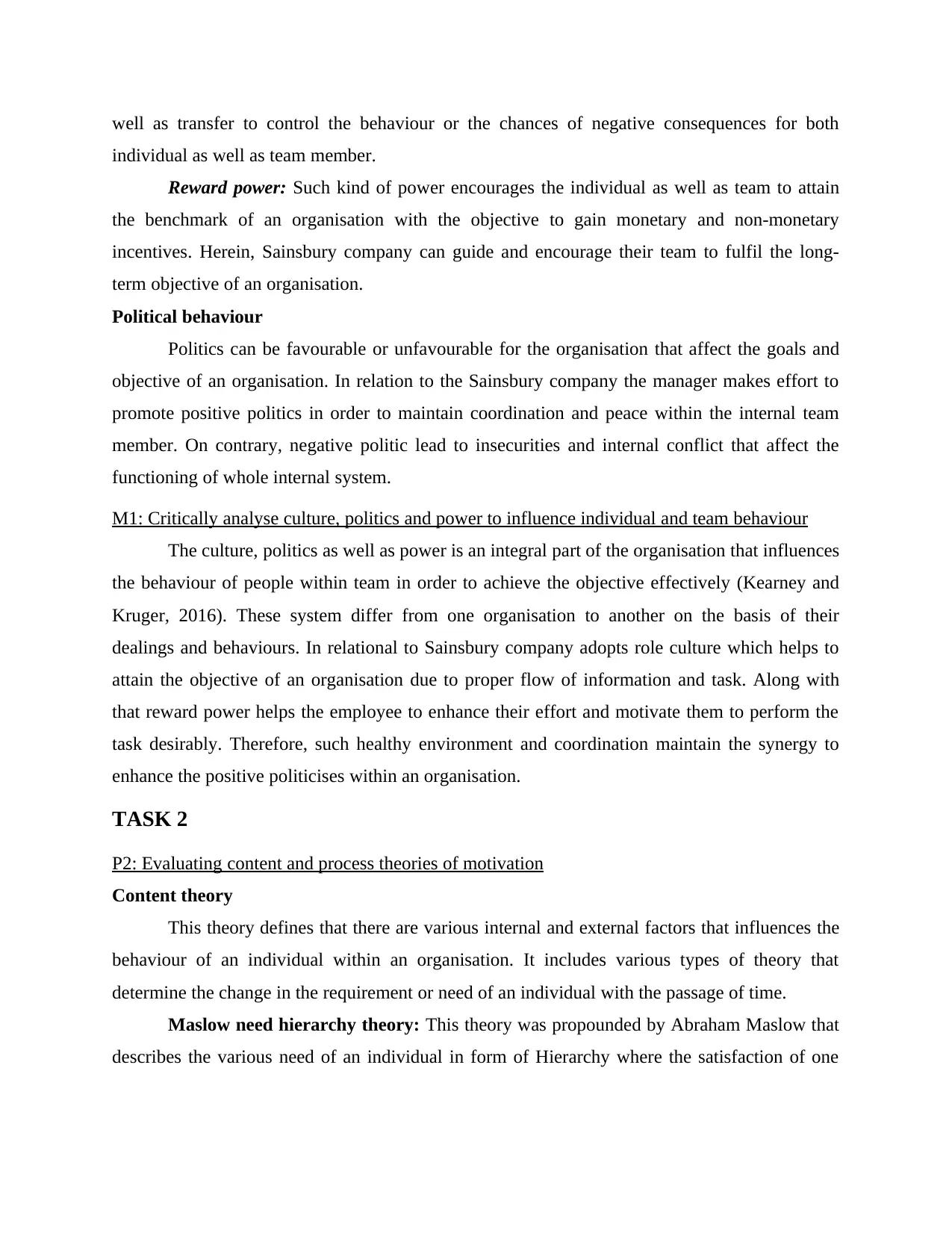
well as transfer to control the behaviour or the chances of negative consequences for both
individual as well as team member.
Reward power: Such kind of power encourages the individual as well as team to attain
the benchmark of an organisation with the objective to gain monetary and non-monetary
incentives. Herein, Sainsbury company can guide and encourage their team to fulfil the long-
term objective of an organisation.
Political behaviour
Politics can be favourable or unfavourable for the organisation that affect the goals and
objective of an organisation. In relation to the Sainsbury company the manager makes effort to
promote positive politics in order to maintain coordination and peace within the internal team
member. On contrary, negative politic lead to insecurities and internal conflict that affect the
functioning of whole internal system.
M1: Critically analyse culture, politics and power to influence individual and team behaviour
The culture, politics as well as power is an integral part of the organisation that influences
the behaviour of people within team in order to achieve the objective effectively (Kearney and
Kruger, 2016). These system differ from one organisation to another on the basis of their
dealings and behaviours. In relational to Sainsbury company adopts role culture which helps to
attain the objective of an organisation due to proper flow of information and task. Along with
that reward power helps the employee to enhance their effort and motivate them to perform the
task desirably. Therefore, such healthy environment and coordination maintain the synergy to
enhance the positive politicises within an organisation.
TASK 2
P2: Evaluating content and process theories of motivation
Content theory
This theory defines that there are various internal and external factors that influences the
behaviour of an individual within an organisation. It includes various types of theory that
determine the change in the requirement or need of an individual with the passage of time.
Maslow need hierarchy theory: This theory was propounded by Abraham Maslow that
describes the various need of an individual in form of Hierarchy where the satisfaction of one
individual as well as team member.
Reward power: Such kind of power encourages the individual as well as team to attain
the benchmark of an organisation with the objective to gain monetary and non-monetary
incentives. Herein, Sainsbury company can guide and encourage their team to fulfil the long-
term objective of an organisation.
Political behaviour
Politics can be favourable or unfavourable for the organisation that affect the goals and
objective of an organisation. In relation to the Sainsbury company the manager makes effort to
promote positive politics in order to maintain coordination and peace within the internal team
member. On contrary, negative politic lead to insecurities and internal conflict that affect the
functioning of whole internal system.
M1: Critically analyse culture, politics and power to influence individual and team behaviour
The culture, politics as well as power is an integral part of the organisation that influences
the behaviour of people within team in order to achieve the objective effectively (Kearney and
Kruger, 2016). These system differ from one organisation to another on the basis of their
dealings and behaviours. In relational to Sainsbury company adopts role culture which helps to
attain the objective of an organisation due to proper flow of information and task. Along with
that reward power helps the employee to enhance their effort and motivate them to perform the
task desirably. Therefore, such healthy environment and coordination maintain the synergy to
enhance the positive politicises within an organisation.
TASK 2
P2: Evaluating content and process theories of motivation
Content theory
This theory defines that there are various internal and external factors that influences the
behaviour of an individual within an organisation. It includes various types of theory that
determine the change in the requirement or need of an individual with the passage of time.
Maslow need hierarchy theory: This theory was propounded by Abraham Maslow that
describes the various need of an individual in form of Hierarchy where the satisfaction of one
⊘ This is a preview!⊘
Do you want full access?
Subscribe today to unlock all pages.

Trusted by 1+ million students worldwide
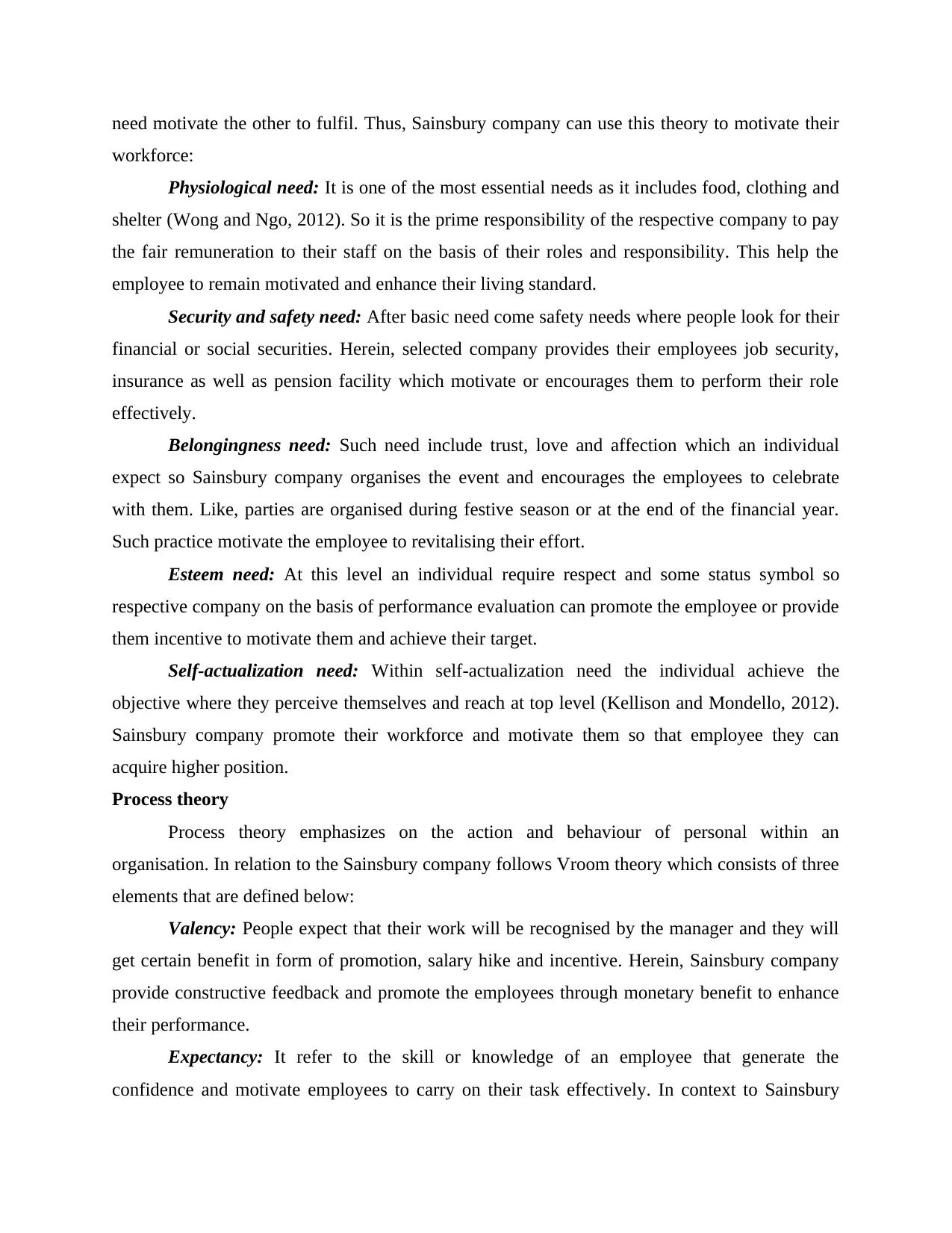
need motivate the other to fulfil. Thus, Sainsbury company can use this theory to motivate their
workforce:
Physiological need: It is one of the most essential needs as it includes food, clothing and
shelter (Wong and Ngo, 2012). So it is the prime responsibility of the respective company to pay
the fair remuneration to their staff on the basis of their roles and responsibility. This help the
employee to remain motivated and enhance their living standard.
Security and safety need: After basic need come safety needs where people look for their
financial or social securities. Herein, selected company provides their employees job security,
insurance as well as pension facility which motivate or encourages them to perform their role
effectively.
Belongingness need: Such need include trust, love and affection which an individual
expect so Sainsbury company organises the event and encourages the employees to celebrate
with them. Like, parties are organised during festive season or at the end of the financial year.
Such practice motivate the employee to revitalising their effort.
Esteem need: At this level an individual require respect and some status symbol so
respective company on the basis of performance evaluation can promote the employee or provide
them incentive to motivate them and achieve their target.
Self-actualization need: Within self-actualization need the individual achieve the
objective where they perceive themselves and reach at top level (Kellison and Mondello, 2012).
Sainsbury company promote their workforce and motivate them so that employee they can
acquire higher position.
Process theory
Process theory emphasizes on the action and behaviour of personal within an
organisation. In relation to the Sainsbury company follows Vroom theory which consists of three
elements that are defined below:
Valency: People expect that their work will be recognised by the manager and they will
get certain benefit in form of promotion, salary hike and incentive. Herein, Sainsbury company
provide constructive feedback and promote the employees through monetary benefit to enhance
their performance.
Expectancy: It refer to the skill or knowledge of an employee that generate the
confidence and motivate employees to carry on their task effectively. In context to Sainsbury
workforce:
Physiological need: It is one of the most essential needs as it includes food, clothing and
shelter (Wong and Ngo, 2012). So it is the prime responsibility of the respective company to pay
the fair remuneration to their staff on the basis of their roles and responsibility. This help the
employee to remain motivated and enhance their living standard.
Security and safety need: After basic need come safety needs where people look for their
financial or social securities. Herein, selected company provides their employees job security,
insurance as well as pension facility which motivate or encourages them to perform their role
effectively.
Belongingness need: Such need include trust, love and affection which an individual
expect so Sainsbury company organises the event and encourages the employees to celebrate
with them. Like, parties are organised during festive season or at the end of the financial year.
Such practice motivate the employee to revitalising their effort.
Esteem need: At this level an individual require respect and some status symbol so
respective company on the basis of performance evaluation can promote the employee or provide
them incentive to motivate them and achieve their target.
Self-actualization need: Within self-actualization need the individual achieve the
objective where they perceive themselves and reach at top level (Kellison and Mondello, 2012).
Sainsbury company promote their workforce and motivate them so that employee they can
acquire higher position.
Process theory
Process theory emphasizes on the action and behaviour of personal within an
organisation. In relation to the Sainsbury company follows Vroom theory which consists of three
elements that are defined below:
Valency: People expect that their work will be recognised by the manager and they will
get certain benefit in form of promotion, salary hike and incentive. Herein, Sainsbury company
provide constructive feedback and promote the employees through monetary benefit to enhance
their performance.
Expectancy: It refer to the skill or knowledge of an employee that generate the
confidence and motivate employees to carry on their task effectively. In context to Sainsbury
Paraphrase This Document
Need a fresh take? Get an instant paraphrase of this document with our AI Paraphraser
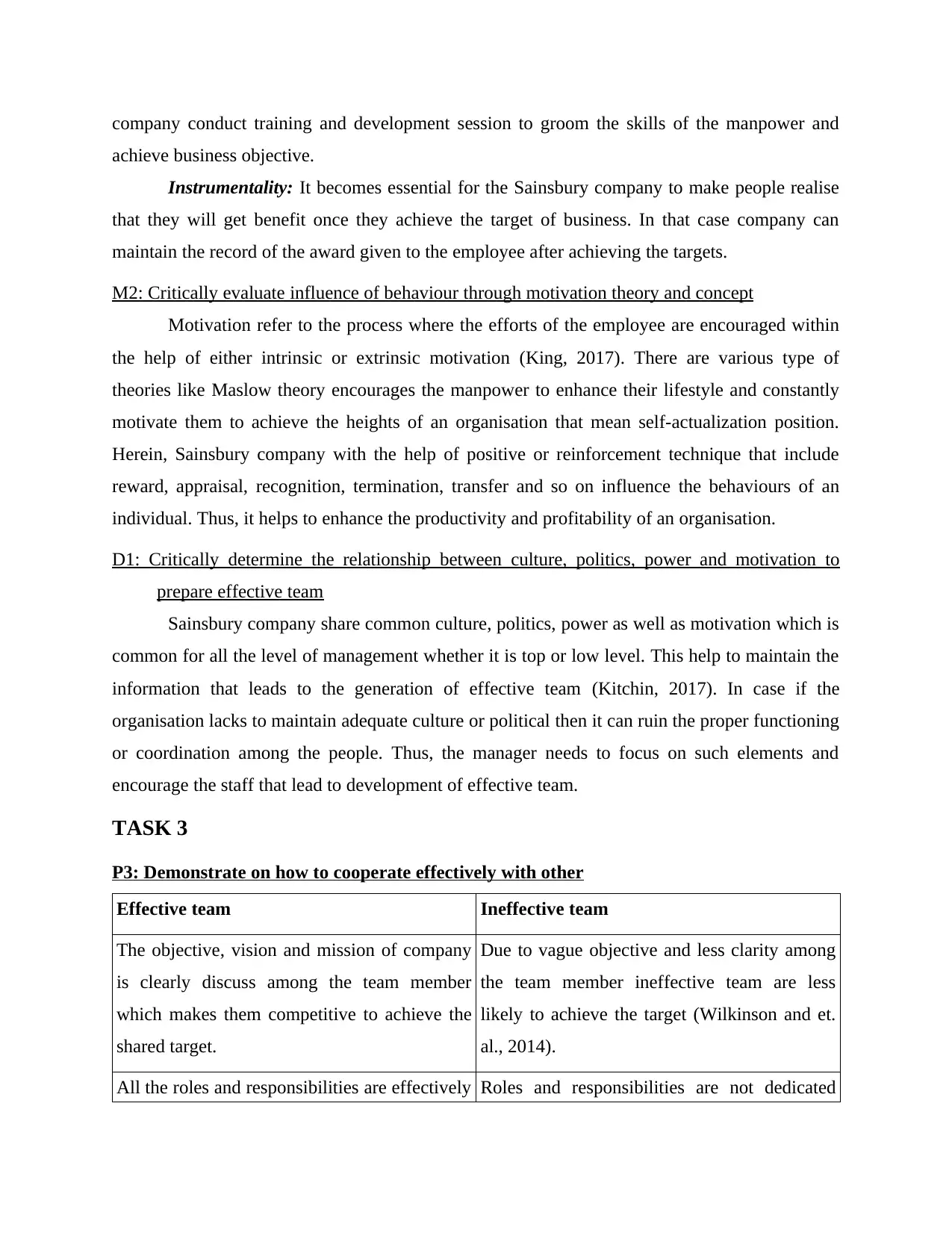
company conduct training and development session to groom the skills of the manpower and
achieve business objective.
Instrumentality: It becomes essential for the Sainsbury company to make people realise
that they will get benefit once they achieve the target of business. In that case company can
maintain the record of the award given to the employee after achieving the targets.
M2: Critically evaluate influence of behaviour through motivation theory and concept
Motivation refer to the process where the efforts of the employee are encouraged within
the help of either intrinsic or extrinsic motivation (King, 2017). There are various type of
theories like Maslow theory encourages the manpower to enhance their lifestyle and constantly
motivate them to achieve the heights of an organisation that mean self-actualization position.
Herein, Sainsbury company with the help of positive or reinforcement technique that include
reward, appraisal, recognition, termination, transfer and so on influence the behaviours of an
individual. Thus, it helps to enhance the productivity and profitability of an organisation.
D1: Critically determine the relationship between culture, politics, power and motivation to
prepare effective team
Sainsbury company share common culture, politics, power as well as motivation which is
common for all the level of management whether it is top or low level. This help to maintain the
information that leads to the generation of effective team (Kitchin, 2017). In case if the
organisation lacks to maintain adequate culture or political then it can ruin the proper functioning
or coordination among the people. Thus, the manager needs to focus on such elements and
encourage the staff that lead to development of effective team.
TASK 3
P3: Demonstrate on how to cooperate effectively with other
Effective team Ineffective team
The objective, vision and mission of company
is clearly discuss among the team member
which makes them competitive to achieve the
shared target.
Due to vague objective and less clarity among
the team member ineffective team are less
likely to achieve the target (Wilkinson and et.
al., 2014).
All the roles and responsibilities are effectively Roles and responsibilities are not dedicated
achieve business objective.
Instrumentality: It becomes essential for the Sainsbury company to make people realise
that they will get benefit once they achieve the target of business. In that case company can
maintain the record of the award given to the employee after achieving the targets.
M2: Critically evaluate influence of behaviour through motivation theory and concept
Motivation refer to the process where the efforts of the employee are encouraged within
the help of either intrinsic or extrinsic motivation (King, 2017). There are various type of
theories like Maslow theory encourages the manpower to enhance their lifestyle and constantly
motivate them to achieve the heights of an organisation that mean self-actualization position.
Herein, Sainsbury company with the help of positive or reinforcement technique that include
reward, appraisal, recognition, termination, transfer and so on influence the behaviours of an
individual. Thus, it helps to enhance the productivity and profitability of an organisation.
D1: Critically determine the relationship between culture, politics, power and motivation to
prepare effective team
Sainsbury company share common culture, politics, power as well as motivation which is
common for all the level of management whether it is top or low level. This help to maintain the
information that leads to the generation of effective team (Kitchin, 2017). In case if the
organisation lacks to maintain adequate culture or political then it can ruin the proper functioning
or coordination among the people. Thus, the manager needs to focus on such elements and
encourage the staff that lead to development of effective team.
TASK 3
P3: Demonstrate on how to cooperate effectively with other
Effective team Ineffective team
The objective, vision and mission of company
is clearly discuss among the team member
which makes them competitive to achieve the
shared target.
Due to vague objective and less clarity among
the team member ineffective team are less
likely to achieve the target (Wilkinson and et.
al., 2014).
All the roles and responsibilities are effectively Roles and responsibilities are not dedicated
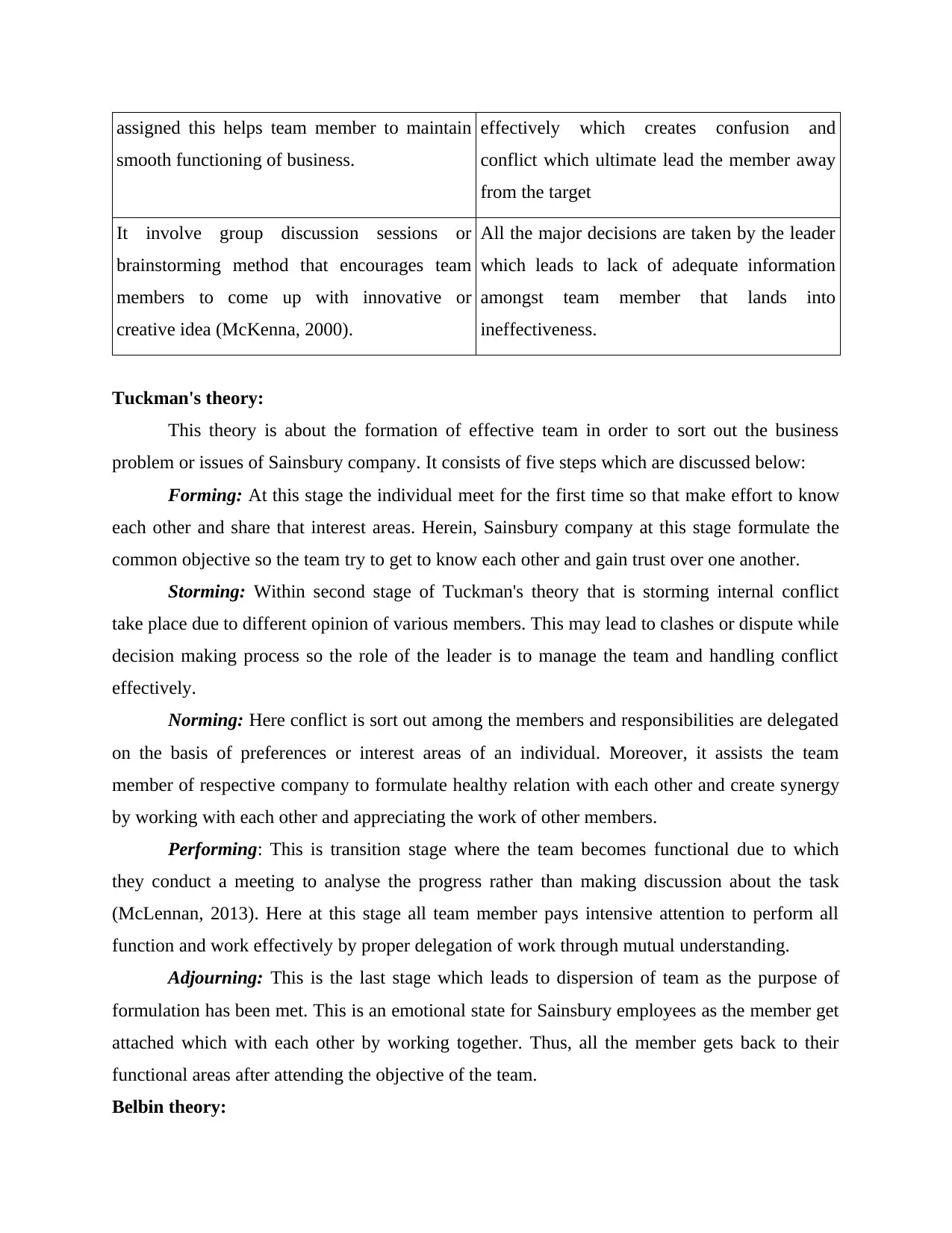
assigned this helps team member to maintain
smooth functioning of business.
effectively which creates confusion and
conflict which ultimate lead the member away
from the target
It involve group discussion sessions or
brainstorming method that encourages team
members to come up with innovative or
creative idea (McKenna, 2000).
All the major decisions are taken by the leader
which leads to lack of adequate information
amongst team member that lands into
ineffectiveness.
Tuckman's theory:
This theory is about the formation of effective team in order to sort out the business
problem or issues of Sainsbury company. It consists of five steps which are discussed below:
Forming: At this stage the individual meet for the first time so that make effort to know
each other and share that interest areas. Herein, Sainsbury company at this stage formulate the
common objective so the team try to get to know each other and gain trust over one another.
Storming: Within second stage of Tuckman's theory that is storming internal conflict
take place due to different opinion of various members. This may lead to clashes or dispute while
decision making process so the role of the leader is to manage the team and handling conflict
effectively.
Norming: Here conflict is sort out among the members and responsibilities are delegated
on the basis of preferences or interest areas of an individual. Moreover, it assists the team
member of respective company to formulate healthy relation with each other and create synergy
by working with each other and appreciating the work of other members.
Performing: This is transition stage where the team becomes functional due to which
they conduct a meeting to analyse the progress rather than making discussion about the task
(McLennan, 2013). Here at this stage all team member pays intensive attention to perform all
function and work effectively by proper delegation of work through mutual understanding.
Adjourning: This is the last stage which leads to dispersion of team as the purpose of
formulation has been met. This is an emotional state for Sainsbury employees as the member get
attached which with each other by working together. Thus, all the member gets back to their
functional areas after attending the objective of the team.
Belbin theory:
smooth functioning of business.
effectively which creates confusion and
conflict which ultimate lead the member away
from the target
It involve group discussion sessions or
brainstorming method that encourages team
members to come up with innovative or
creative idea (McKenna, 2000).
All the major decisions are taken by the leader
which leads to lack of adequate information
amongst team member that lands into
ineffectiveness.
Tuckman's theory:
This theory is about the formation of effective team in order to sort out the business
problem or issues of Sainsbury company. It consists of five steps which are discussed below:
Forming: At this stage the individual meet for the first time so that make effort to know
each other and share that interest areas. Herein, Sainsbury company at this stage formulate the
common objective so the team try to get to know each other and gain trust over one another.
Storming: Within second stage of Tuckman's theory that is storming internal conflict
take place due to different opinion of various members. This may lead to clashes or dispute while
decision making process so the role of the leader is to manage the team and handling conflict
effectively.
Norming: Here conflict is sort out among the members and responsibilities are delegated
on the basis of preferences or interest areas of an individual. Moreover, it assists the team
member of respective company to formulate healthy relation with each other and create synergy
by working with each other and appreciating the work of other members.
Performing: This is transition stage where the team becomes functional due to which
they conduct a meeting to analyse the progress rather than making discussion about the task
(McLennan, 2013). Here at this stage all team member pays intensive attention to perform all
function and work effectively by proper delegation of work through mutual understanding.
Adjourning: This is the last stage which leads to dispersion of team as the purpose of
formulation has been met. This is an emotional state for Sainsbury employees as the member get
attached which with each other by working together. Thus, all the member gets back to their
functional areas after attending the objective of the team.
Belbin theory:
⊘ This is a preview!⊘
Do you want full access?
Subscribe today to unlock all pages.

Trusted by 1+ million students worldwide
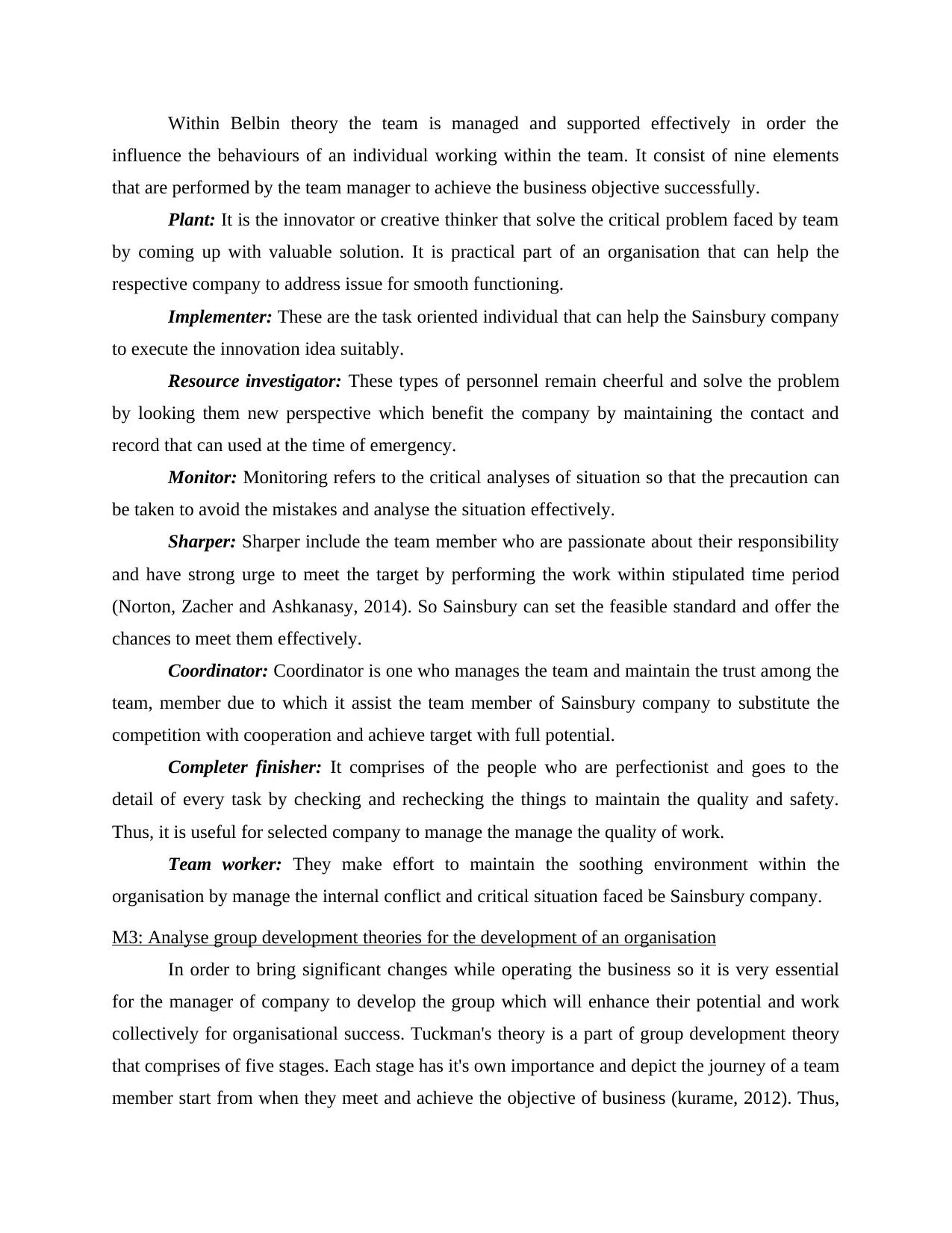
Within Belbin theory the team is managed and supported effectively in order the
influence the behaviours of an individual working within the team. It consist of nine elements
that are performed by the team manager to achieve the business objective successfully.
Plant: It is the innovator or creative thinker that solve the critical problem faced by team
by coming up with valuable solution. It is practical part of an organisation that can help the
respective company to address issue for smooth functioning.
Implementer: These are the task oriented individual that can help the Sainsbury company
to execute the innovation idea suitably.
Resource investigator: These types of personnel remain cheerful and solve the problem
by looking them new perspective which benefit the company by maintaining the contact and
record that can used at the time of emergency.
Monitor: Monitoring refers to the critical analyses of situation so that the precaution can
be taken to avoid the mistakes and analyse the situation effectively.
Sharper: Sharper include the team member who are passionate about their responsibility
and have strong urge to meet the target by performing the work within stipulated time period
(Norton, Zacher and Ashkanasy, 2014). So Sainsbury can set the feasible standard and offer the
chances to meet them effectively.
Coordinator: Coordinator is one who manages the team and maintain the trust among the
team, member due to which it assist the team member of Sainsbury company to substitute the
competition with cooperation and achieve target with full potential.
Completer finisher: It comprises of the people who are perfectionist and goes to the
detail of every task by checking and rechecking the things to maintain the quality and safety.
Thus, it is useful for selected company to manage the manage the quality of work.
Team worker: They make effort to maintain the soothing environment within the
organisation by manage the internal conflict and critical situation faced be Sainsbury company.
M3: Analyse group development theories for the development of an organisation
In order to bring significant changes while operating the business so it is very essential
for the manager of company to develop the group which will enhance their potential and work
collectively for organisational success. Tuckman's theory is a part of group development theory
that comprises of five stages. Each stage has it's own importance and depict the journey of a team
member start from when they meet and achieve the objective of business (kurame, 2012). Thus,
influence the behaviours of an individual working within the team. It consist of nine elements
that are performed by the team manager to achieve the business objective successfully.
Plant: It is the innovator or creative thinker that solve the critical problem faced by team
by coming up with valuable solution. It is practical part of an organisation that can help the
respective company to address issue for smooth functioning.
Implementer: These are the task oriented individual that can help the Sainsbury company
to execute the innovation idea suitably.
Resource investigator: These types of personnel remain cheerful and solve the problem
by looking them new perspective which benefit the company by maintaining the contact and
record that can used at the time of emergency.
Monitor: Monitoring refers to the critical analyses of situation so that the precaution can
be taken to avoid the mistakes and analyse the situation effectively.
Sharper: Sharper include the team member who are passionate about their responsibility
and have strong urge to meet the target by performing the work within stipulated time period
(Norton, Zacher and Ashkanasy, 2014). So Sainsbury can set the feasible standard and offer the
chances to meet them effectively.
Coordinator: Coordinator is one who manages the team and maintain the trust among the
team, member due to which it assist the team member of Sainsbury company to substitute the
competition with cooperation and achieve target with full potential.
Completer finisher: It comprises of the people who are perfectionist and goes to the
detail of every task by checking and rechecking the things to maintain the quality and safety.
Thus, it is useful for selected company to manage the manage the quality of work.
Team worker: They make effort to maintain the soothing environment within the
organisation by manage the internal conflict and critical situation faced be Sainsbury company.
M3: Analyse group development theories for the development of an organisation
In order to bring significant changes while operating the business so it is very essential
for the manager of company to develop the group which will enhance their potential and work
collectively for organisational success. Tuckman's theory is a part of group development theory
that comprises of five stages. Each stage has it's own importance and depict the journey of a team
member start from when they meet and achieve the objective of business (kurame, 2012). Thus,
Paraphrase This Document
Need a fresh take? Get an instant paraphrase of this document with our AI Paraphraser
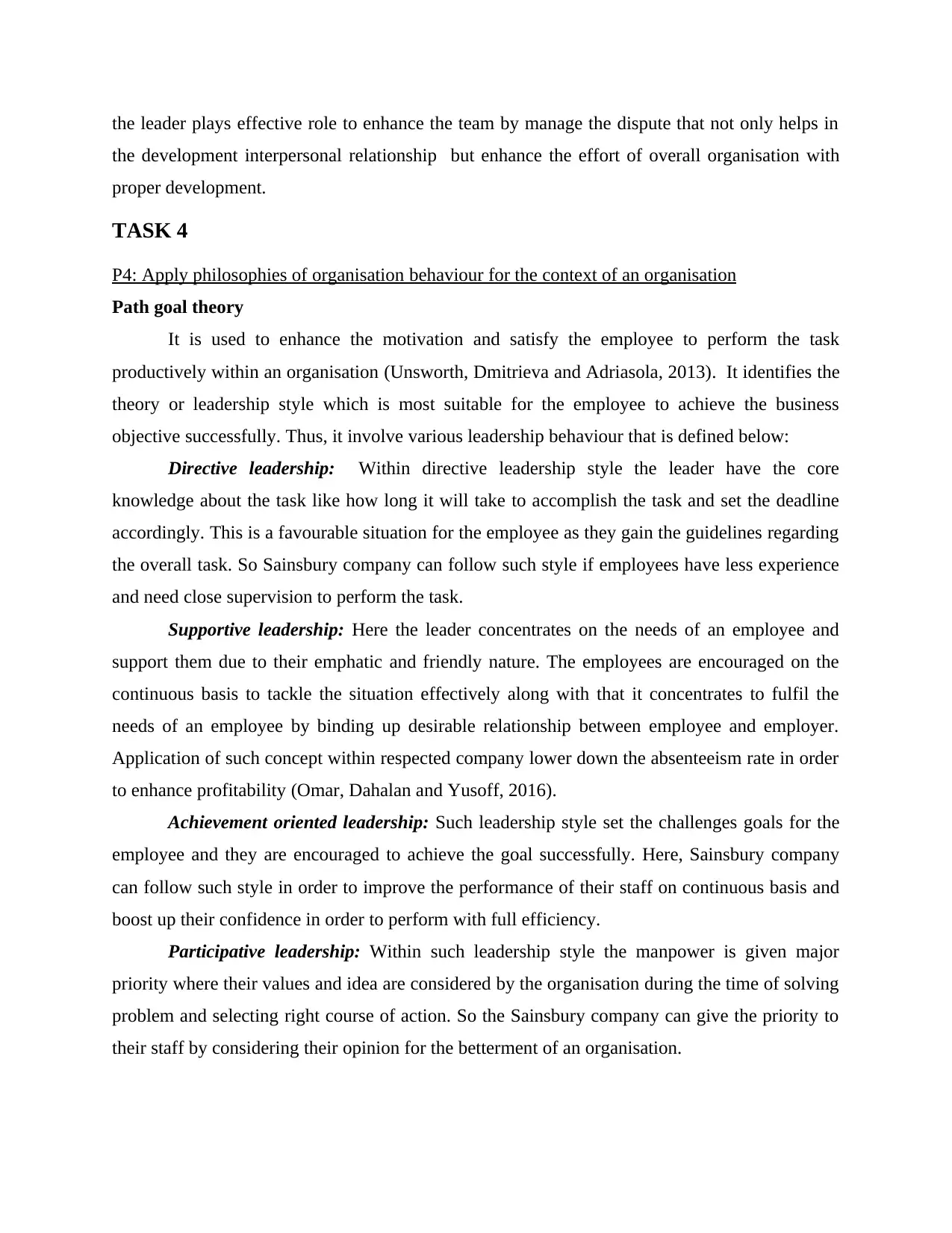
the leader plays effective role to enhance the team by manage the dispute that not only helps in
the development interpersonal relationship but enhance the effort of overall organisation with
proper development.
TASK 4
P4: Apply philosophies of organisation behaviour for the context of an organisation
Path goal theory
It is used to enhance the motivation and satisfy the employee to perform the task
productively within an organisation (Unsworth, Dmitrieva and Adriasola, 2013). It identifies the
theory or leadership style which is most suitable for the employee to achieve the business
objective successfully. Thus, it involve various leadership behaviour that is defined below:
Directive leadership: Within directive leadership style the leader have the core
knowledge about the task like how long it will take to accomplish the task and set the deadline
accordingly. This is a favourable situation for the employee as they gain the guidelines regarding
the overall task. So Sainsbury company can follow such style if employees have less experience
and need close supervision to perform the task.
Supportive leadership: Here the leader concentrates on the needs of an employee and
support them due to their emphatic and friendly nature. The employees are encouraged on the
continuous basis to tackle the situation effectively along with that it concentrates to fulfil the
needs of an employee by binding up desirable relationship between employee and employer.
Application of such concept within respected company lower down the absenteeism rate in order
to enhance profitability (Omar, Dahalan and Yusoff, 2016).
Achievement oriented leadership: Such leadership style set the challenges goals for the
employee and they are encouraged to achieve the goal successfully. Here, Sainsbury company
can follow such style in order to improve the performance of their staff on continuous basis and
boost up their confidence in order to perform with full efficiency.
Participative leadership: Within such leadership style the manpower is given major
priority where their values and idea are considered by the organisation during the time of solving
problem and selecting right course of action. So the Sainsbury company can give the priority to
their staff by considering their opinion for the betterment of an organisation.
the development interpersonal relationship but enhance the effort of overall organisation with
proper development.
TASK 4
P4: Apply philosophies of organisation behaviour for the context of an organisation
Path goal theory
It is used to enhance the motivation and satisfy the employee to perform the task
productively within an organisation (Unsworth, Dmitrieva and Adriasola, 2013). It identifies the
theory or leadership style which is most suitable for the employee to achieve the business
objective successfully. Thus, it involve various leadership behaviour that is defined below:
Directive leadership: Within directive leadership style the leader have the core
knowledge about the task like how long it will take to accomplish the task and set the deadline
accordingly. This is a favourable situation for the employee as they gain the guidelines regarding
the overall task. So Sainsbury company can follow such style if employees have less experience
and need close supervision to perform the task.
Supportive leadership: Here the leader concentrates on the needs of an employee and
support them due to their emphatic and friendly nature. The employees are encouraged on the
continuous basis to tackle the situation effectively along with that it concentrates to fulfil the
needs of an employee by binding up desirable relationship between employee and employer.
Application of such concept within respected company lower down the absenteeism rate in order
to enhance profitability (Omar, Dahalan and Yusoff, 2016).
Achievement oriented leadership: Such leadership style set the challenges goals for the
employee and they are encouraged to achieve the goal successfully. Here, Sainsbury company
can follow such style in order to improve the performance of their staff on continuous basis and
boost up their confidence in order to perform with full efficiency.
Participative leadership: Within such leadership style the manpower is given major
priority where their values and idea are considered by the organisation during the time of solving
problem and selecting right course of action. So the Sainsbury company can give the priority to
their staff by considering their opinion for the betterment of an organisation.
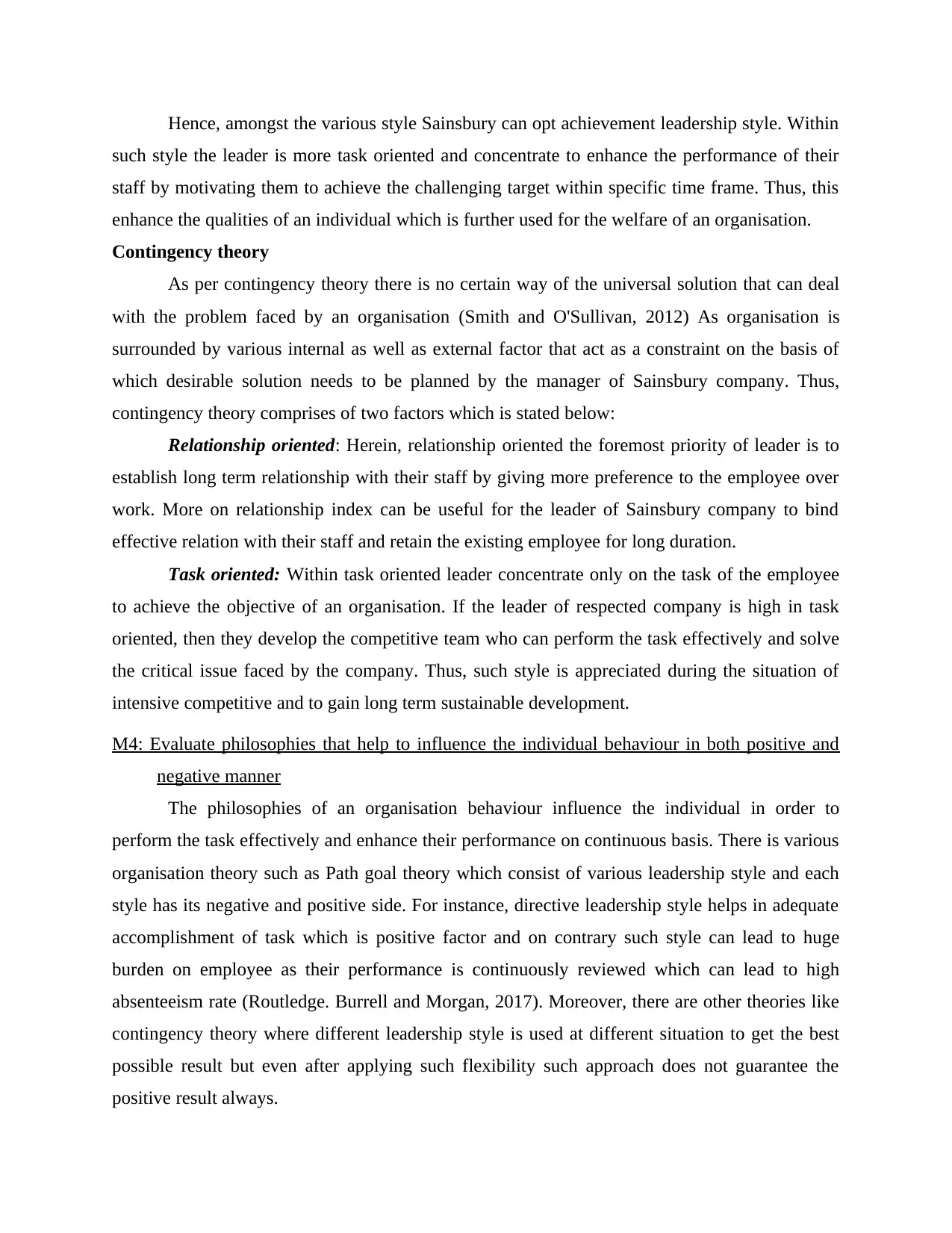
Hence, amongst the various style Sainsbury can opt achievement leadership style. Within
such style the leader is more task oriented and concentrate to enhance the performance of their
staff by motivating them to achieve the challenging target within specific time frame. Thus, this
enhance the qualities of an individual which is further used for the welfare of an organisation.
Contingency theory
As per contingency theory there is no certain way of the universal solution that can deal
with the problem faced by an organisation (Smith and O'Sullivan, 2012) As organisation is
surrounded by various internal as well as external factor that act as a constraint on the basis of
which desirable solution needs to be planned by the manager of Sainsbury company. Thus,
contingency theory comprises of two factors which is stated below:
Relationship oriented: Herein, relationship oriented the foremost priority of leader is to
establish long term relationship with their staff by giving more preference to the employee over
work. More on relationship index can be useful for the leader of Sainsbury company to bind
effective relation with their staff and retain the existing employee for long duration.
Task oriented: Within task oriented leader concentrate only on the task of the employee
to achieve the objective of an organisation. If the leader of respected company is high in task
oriented, then they develop the competitive team who can perform the task effectively and solve
the critical issue faced by the company. Thus, such style is appreciated during the situation of
intensive competitive and to gain long term sustainable development.
M4: Evaluate philosophies that help to influence the individual behaviour in both positive and
negative manner
The philosophies of an organisation behaviour influence the individual in order to
perform the task effectively and enhance their performance on continuous basis. There is various
organisation theory such as Path goal theory which consist of various leadership style and each
style has its negative and positive side. For instance, directive leadership style helps in adequate
accomplishment of task which is positive factor and on contrary such style can lead to huge
burden on employee as their performance is continuously reviewed which can lead to high
absenteeism rate (Routledge. Burrell and Morgan, 2017). Moreover, there are other theories like
contingency theory where different leadership style is used at different situation to get the best
possible result but even after applying such flexibility such approach does not guarantee the
positive result always.
such style the leader is more task oriented and concentrate to enhance the performance of their
staff by motivating them to achieve the challenging target within specific time frame. Thus, this
enhance the qualities of an individual which is further used for the welfare of an organisation.
Contingency theory
As per contingency theory there is no certain way of the universal solution that can deal
with the problem faced by an organisation (Smith and O'Sullivan, 2012) As organisation is
surrounded by various internal as well as external factor that act as a constraint on the basis of
which desirable solution needs to be planned by the manager of Sainsbury company. Thus,
contingency theory comprises of two factors which is stated below:
Relationship oriented: Herein, relationship oriented the foremost priority of leader is to
establish long term relationship with their staff by giving more preference to the employee over
work. More on relationship index can be useful for the leader of Sainsbury company to bind
effective relation with their staff and retain the existing employee for long duration.
Task oriented: Within task oriented leader concentrate only on the task of the employee
to achieve the objective of an organisation. If the leader of respected company is high in task
oriented, then they develop the competitive team who can perform the task effectively and solve
the critical issue faced by the company. Thus, such style is appreciated during the situation of
intensive competitive and to gain long term sustainable development.
M4: Evaluate philosophies that help to influence the individual behaviour in both positive and
negative manner
The philosophies of an organisation behaviour influence the individual in order to
perform the task effectively and enhance their performance on continuous basis. There is various
organisation theory such as Path goal theory which consist of various leadership style and each
style has its negative and positive side. For instance, directive leadership style helps in adequate
accomplishment of task which is positive factor and on contrary such style can lead to huge
burden on employee as their performance is continuously reviewed which can lead to high
absenteeism rate (Routledge. Burrell and Morgan, 2017). Moreover, there are other theories like
contingency theory where different leadership style is used at different situation to get the best
possible result but even after applying such flexibility such approach does not guarantee the
positive result always.
⊘ This is a preview!⊘
Do you want full access?
Subscribe today to unlock all pages.

Trusted by 1+ million students worldwide
1 out of 15
Related Documents
Your All-in-One AI-Powered Toolkit for Academic Success.
+13062052269
info@desklib.com
Available 24*7 on WhatsApp / Email
![[object Object]](/_next/static/media/star-bottom.7253800d.svg)
Unlock your academic potential
Copyright © 2020–2025 A2Z Services. All Rights Reserved. Developed and managed by ZUCOL.




